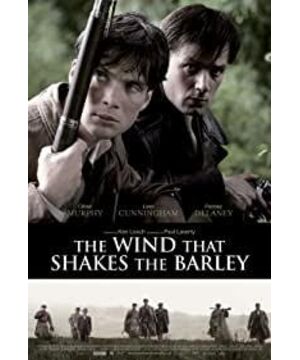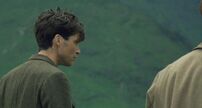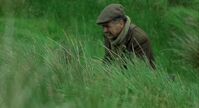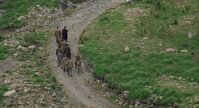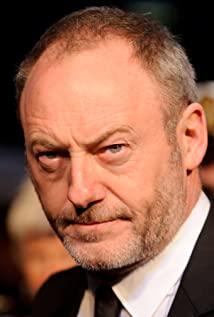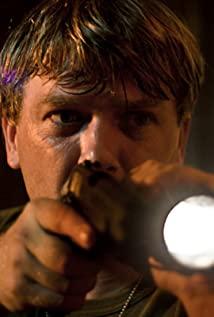However, Howe et al.'s criticism of "The Wind Blows the Wheat Waves" is irrelevant. Is the brutality of the British army a systemic oppression or an occasional "individual phenomenon"? Is the Irish Republican Army more cold-blooded than depicted in the movie? How much influence does the socialist trend of thought have on the main war faction? What is the ratio of males to females, these questions have their own value, but they do not become the basis for criticizing the historical narrative and reconstruction of the film. Because, unlike "Michael Collins", "The Wind and the Wheat" does not castrate the moral justifiability of the "non-protagonist" position while abstracting, reconstructing, and symbolizing history. (moral justifiability). The Peacekeepers were not seen as "new bad chaps" after the British, as Howe put it - the Teds intervened in court trials of robbing the rich and helping the poor not to enrich themselves, but to take into account the entire war situation ("United Front"?); To advocate a truce, not out of selfishness of power struggle or vested interests, but to hope that the country will be free from unscrupulous military disasters; reluctantly executing the former Paoze and brothers does not mean that they have become The "dog legs" of the British, but because they truly believe that peace is precious and hard to come by and have to make sacrifices. The positions of the two factions may be reconstructed, the internal complexity may be ignored, and the personnel composition may be symbolized, but the conflict between the two is not (as in Michael Collins) expressed as "gentleman" and "gentleman". The struggle between villain, hero and villain, self-sacrifice and abolition of the public for personal reasons, and the struggle between "people with lofty ideals" and "traitors and lackeys" are all concepts in the true sense and with a certain degree of morality and rationality. Conflict between them—it is important to acknowledge and express that “both ideas have a certain degree of moral rationality”, otherwise the conflict of ideas will become the “two lines” of “right” and “wrong” in the theme film. battle. While Ken Loach expresses his ideas through the mouths of the protagonist and other protagonists, he doesn't try to dismiss the opposition as useless. The debate between Zhan and the two factions is always open, and neither can persuade the other. This is not because one of them is utterly ignorant or stubborn, but because of the fundamental diversity and irreconcilability of moral values and reasons.
Or think that these are just the narrative ethics of the film, not about the artistry - if the film is primarily about art and nothing else, you can ignore it. Not so. In fact, it is precisely the diversity and irreconciliation of values that has created the most profound tragedy in our world. Damian said in a suicide note to his girlfriend Cenad, "I'm afraid, inside, he's already dead". However, we know that Ted's heart is not dead, and those who are dead will not insist on executing his brother who he thinks is unforgivable (just like Damian personally executes the young Chris who betrayed his comrade under the threat of the enemy) , and will not choked after the hands can not make a sound. Only a living heart hurts. Imagine if Ted in the film did not fight against Damian for the sake of protecting the belief in peace, but turned to the British government as its lackey for various despicable purposes, and became a walking corpse who would not hesitate to kill his own brother for drunkenness and wealth ( Just like the image of De Valera in "Michael Collins"), we may be indignant, we may be sad, but can we still experience the great sadness that has nowhere to escape and penetrates the heart?
--------------The dividing line that shakes the spring breeze --------------
The film is named after Robert Dwyer Joyce (1836-1883) in 1798 A folk song written against the backdrop of the Irish Uprising. This song has been covered by many Irish singers, and they are interpreted according to different interpretations. Some are noble and generous, some are calm and retreating, but what moved me the most was the acapella singing of the old dirge woman at Michal's funeral in the film ( http:/ /www.youtube.com/watch?v=VoqwP-vYGPU ).
I sat within a valley green
I sat me with my true love
My sad heart strove to choose between
The old love and the new love
The old for her, the new that made
Me think on Ireland dearly
While soft the wind blew down the glen
And shook the golden barley
'Twas hard the woeful words to frame
To break the ties that bound us
But harder still to bear the shame
Of foreign chains around us
And so I said, "The mountain glen I
'll seek at morning early"
While soft the wind blew down the glen And
shook the golden barley It is "Oró, Sé do Bheatha 'Bhaile" ("Oh, welcome back home"), whose birth, evolution and circulation can be said to have been throughout the tortuous history of the Irish struggle for independence ( http://www.youtube.com/watch ?v=v9x6fG3QrBE ). Tá Gráinne Mhaol ag go duill ar sáile, (Grainne Mhaol is coming over the sea,)
óglaigh armtha léi mar gharda, (Armed warriors along with her as her guard,)
Gaeil iad féin is ní Gaill ná Spáinnigh, (They are Irishmen, not foreigners nor Spanish...)
is cuirfidh siad ruaig ar Ghallaibh. (And they will rout the foreigners!)
[Chorus] Oró, sé do bheatha abhaile, (Oh-ro You're welcome home,)
Oró, sé do bheatha abhaile, (Oh-ro You're welcome home,)
Oró, sé do bheatha abhaile (Oh-ro You're welcome home...)
Anois ar theacht an tsamhraidh. (Now that summer's coming!)
A bhuí le Rí na bhFeart go bhfeiceam, (May it please the God of Miracles that we may see,)
mura mbeam beo ina dhiaidh ach seachtain, (Although we only live a week after it,)
Gráinne Mhaol agus míle gaiscíoch, (Grainne Mhaol and a thousand warriors...)
ag fógairt fáin ar Ghallaibh. (Dispersing the foreigners!)
[Chorus] …
View more about The Wind that Shakes the Barley reviews


